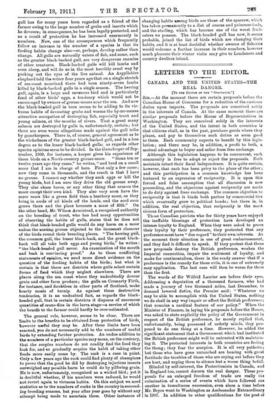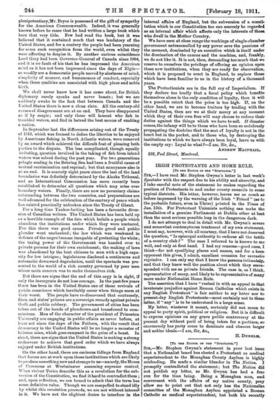LETTERS TO THE EDITOR.
CANADA AND THE UNITED STATES—THE REAL DANGER.
[To THE EDTTOE OF TUE spEcriros."] Sra,—At the moment there are certain proposals before the Canadian House of Commons for a reduction of the customs duties upon imports. The proposals are conceived solely in the interests of Canada. At the same moment there are similar proposals before the House of Representatives in Washington. They are conceived solely in the interests of the United States, and the intent in both countries is that citizens shall, as in the past, purchase goods where they please, and pay to themselves such duties as seem good to them. Each community expects to benefit by this legis- lation; and there may be, in addition, a profit to both, a mutual advantage to buyer and seller from free exchange.
Although this legislation happens to be concurrent, each community is free to adopt or reject the proposals. Both maintain intact their fiscal independence. It is quite certain, however, that each has been privy to the plans of the other ; and this participation in a common knowledge has been tortured to an expression of reciprocity. It is upon this forced and false assumption that all discussion is now proceeding, and the objections against reciprocity are made to do duty against freer exchange. The common objection to reciprocity is that it binds both parties by commercial ties which eventually grow to political bonds ; but there is, in addition, the real objection, that reciprocity is the most vicious form of protection.
Those Canadian patriots who for thirty years have enjoyed the ineffable blessings of protection have developed an intense loyalty to England. When they were asked to prove their loyalty by their preference, they protested that any preference must have " due regard" to their own interests. At the moment their situation is one of great embarrassment, and they find it difficult to speak. If they protest that these new proposals destroy the British preference, weaken the Imperial connection, impair the sentiment of loyalty, and make for continentalism, there is the ready answer that if a preference is the remedy for these evils, it is one of extremely easy application. The last case will then be worse for them than the first.
The words of Sir Wilfrid Laurier are before their eyes. Addressing a deputation of a thousand farmers, who had made a journey of two thousand miles, last December, to demand lowered duties, the Premier said : " Whatever we may be able to accomplish with the United States, nothing we do shall in any way impair or affect the British preference ; that remains a cardinal feature of our policy." When the Minister of Finance, in laying his proposals before the House, was asked to state explicitly the policy of the Government in respect of the British preference, he merely replied that, unfortunately, being possessed of orderly minds, they pro- posed to do one thing at a time. However, he added the significant statement that a Government which bad instituted the British preference might well be entrusted with maintain- ing it. The protected interests in both countries are feeling the thong ; they fear the scorpion. It is all very pathetic; but those who have gone untouched are bearing with great fortitude the troubles of those who are crying out before they are hurt, and urging them to silence lest a worse thing befall.
Blinded by self-interest, the Protectionists in Canada, and in England too, cannot discern the real danger. These pro- posals for an enlarged freedom of trade are really the culmination of a series of events which have followed one another in tumultuous succession, even since a time before Mr. Bryce went to Washington as Ambassador Extraordinary in 1907. In addition to other qualifications for the post of plenipotentiary,!Mr. Bryce is possessed of the gift of sympathy for the American Commonwealth. Indeed, it was generally known before he came that he bad written a large book which bore that very title. Few had read the book, but it was believed that it contained much that was laudatory of the United States, and for a century the people had been yearning for acme such recognition from the world, even whilst they were affecting to despise it. By another curious coincidence Lord Grey had been Governor-General of Canada since 1904, and it is no fault of his that he has impressed the American mind as it has not been impressed since the days of Elgin— so readily are a democratic people moved by alertness of mind, simplicity of manner, and humaneness of conduct, especially when these qualities are associated with high place and noble birth.
We shall never know how it has come about, for British diplomacy rarely speaks and never boasts ; but we are suddenly awake to the fact that between Canada and the United States there is now a clean slate. All the century-old causes of disagreement are at an end. They have disappeared as if by magic; and only those will lament who fish in troubled waters, and find in hatred the best means of exalting a nation.
In September last the differences arising out of the Treaty of 1S18, which was framed to define the liberties to be enjoyed by Americans fishing in North Atlantic waters, were removed by an award which achieved the difficult feat of pleasing both parties to the dispute. The less complicated, though equally irritating, question involved in the taking of fish from inland waters was solved during the past year. For two generations pelagic sealing in the Behring Sea had been a fruitful cause of mutual recrimination and reprisal; but that annoyance also is at an end. It is scarcely eight years since the last of the land boundaries was definitely determined by the Alaska Tribunal, and an International Commission has more recently been established to detei mine all questions which may arise over boundary waters. Finally, there are now no pecuniary claims outstanding between the two countries, and preparations are well advanced for the celebration of the century of peace which has existed practically unbroken since the Treaty of Ghent, For a long time Yankee-baiting has been a favourite diver- sion of Canadian writers. The United States has been held up .s a horrible example of the fate which befalls a people which abandons the institutions under which they were nurtured, For this there was good cause. Private greed and public plunder went unchecked ; the law which was weakened in defence of the negro became incapable of protecting the white ; the taxing power of the Government was handed over to private persons for their own enrichment; the making of laws was abandoned by the best citizens to men with a high capa- city for low intrigue; legislatures disclosed a continuous and automatic downward degradation, until the spectacle was pre. sented to the world of a rich country governed by poor men whose main concern was to make themselves rich.
But there are signs that the end of this orgy is in sight, if only the insurgents do not lose courage. In the past few years there has been in the United States one of those revivals of public conscience which inevitably occur when things seem at their worst. The people have re-discovered that contumely, fines, and states' prisons are a sovereign remedy against private theft and public robbery. The government of cities has been taken out of the hands of plunderers and transferred to com- missions. Men of the character of the president of Princeton University are engaging in public affairs as never before, at least not since the days of the Fathers, with the result that democracy in the United States will be no longer a monster of hideous mien, which goes rampant in the guise of a beast. In short, there are signs that the United States is making a strong endeavour to achieve that good order which we have always enjoyed under British institutions.
On the other band, there are ominous tidings from England that forces are at work upon those institutions which are likely to produce something new and strange to us—namely, the House of Commons at Westminster assuming supreme control, "When violent Tories describe this as a revolution for the sub- version of the Constitution, we find it hard to contradict them ; and, upon reflection, we are bound to admit that the term has some definitive value. Though we are compelled to stand idly
by whilst this revolution proceeds, we are not without interest in it.. We have not the slightest desire to interfere in the
internal affairs of England, but the subversion of a consti. tution which is our Constitution too can scarcely be regardefi as an internal affair which affects only the interests of those who dwell in the Mother Country.
We have seen at close range the workings of single-chamber government untrammelled by any power save the passions of the moment, dominated by an executive which is itself under the domination of the caucus and the machine, and, frankly, we do not like it. It is not, then, demanding too much that we reserve to ourselves the privilege of offering an opinion upon these new institutions, when they are ready for observation, which it is proposed to erect in England, to replace those which have been familiar to us in the history of a thousand years.
The Protectionists are in the full cry of Imperialism. If they declare too loudly that a fiscal policy which benefits themselves alone is the only condition of loyalty, then it will be a possible retort that the price is too high. If, on the other hand, we are to become traitors by trading with the United States, then are we at their mercy at any moment which they of their own free will may choose to reduce their duties against the things which we have to sell. If disaster comes, the infamy will be to those who have been so sedulously propagating the doctrine that the seat of loyalty is not in the heart but in the pocket, and to those who, by destroying the institutions to which we have always been loyal, leave us with the empty cry: Loyal to whatil—I am, Sir, &c., 216, Peel Street, Montreal.
ANDREW MACPECALU







































 Previous page
Previous page